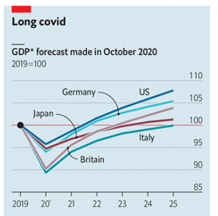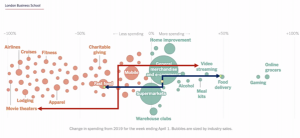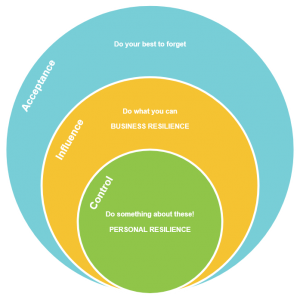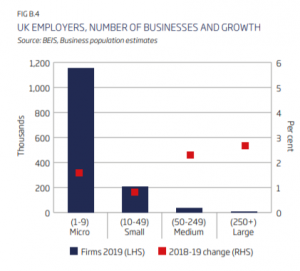
Read time: Under 5 minutes.
Authors: Nathan King
VUCA World
The global pandemic has brought home to everyone that we live in a VUCA world, that is one that is Volatile, Uncertain, Complex and Ambiguous.
The impact of Covid-19 on the UK up to October 2020 (before the second lockdown) has been to knock around 10% off GDP compared to the previous year, with the expectation that it will take a couple of years to regain the lost ground (Economist – 17th October 2020).

Taking a closer look at UK PLC, there are sectors such as aerospace and hospitality that have been hit particularly hard from the enforced social distancing. Whilst those selling online for in home consumption including video streaming and home improvements, have seen substantial growth (London Business School – 1st April 2020).

Managing a VUCA World
So how should business leaders, no matter what sector they operate, respond to a VUCA world?
The key in my opinion is in building both personal and business resilience.
On a practical level, I find the ‘circle of control’ a simple yet effective framework to help work out where best to focus attention. Activities that build personal resilience are completely in a business leaders’ control. Whereas building business resilience requires the involvement of the wider team so is in the influence circle.
Fretting about the outcome of the US election (result hanging in the balance on date of publishing!), Brexit negotiations or length of the second lockdown are clearly outside a business leaders control. So put these out of mind until there is clarity, to avoid using up limited bandwidth.

Personal Resilience
I had the good fortune in taking part recently in the recording of a series of ‘Resilient Leader’ podcasts led by the Firestarter team. As well as benefitting from listening to fascinating insights from other business leaders, it gave me the opportunity to share my own five top tips for ‘personal resilience’, which are summarised below.
- Match your system to your rhythm: There are natural cadences within individuals, teams and businesses. Design a way of working that is tuned into these natural cadences with the flexibility to manage asymmetric working.
- Plan your work and work your plan: I love the African proverb – “for tomorrow belongs to the people who prepare for it today” – as captures the importance of developing (and writing down) a plan if you want anything different to happen. However, the plan should not be set in stone in a VUCA world – recall the battle quote “no plan survives contact with the enemy”. A plan needs to be referred to and course-corrected frequently, in manner of a ‘minimum viable product’.
- Stand on the shoulders of giants: Be opened minded as there is very little in life that someone very bright has not written a book or blog post about. Build time into your week for desk research or book reading to gain fresh perspectives both for specific, as well as deeper, paradigm changing questions.
- Be kind to yourself and to others: You need to look after yourself if you’re going to be able to help number 2, 3, 4, 5… Take time out to recharge, be that exercise, a hobby, reading a book etc. Also recognise that life is tough, with everyone going through good and bad times, so be slow to judge and quick to help.
- Run your own race: Everyone is dealt a different set of cards in life, so whilst learning from others can be instructive, avoid destructive comparison envy. Find your own definition of success that moves beyond purely financial. A great start point for this is the Japanese concept of ‘Ikigai’ which means ‘a reason for being’.
Business Resilience
My preferred definition of business resilience comes from Cranfield School of Management:
‘the ability to anticipate, prepare for, respond and adapt to incremental change and sudden disruptions in order to survive and prosper’
However, a business leaders’ role is demanding and stressful. As well as ensuring the monthly wage bill is paid on time, it requires a smorgasbord of planning and interpersonal skills including:
- Empathy for staff, customer and supplier needs
- Short-to-long term predictions
- Systems, processes and organisational structure simplification
- Delegation of tasks and holding others to account for delivery
Unsurprisingly there rarely feels enough time in the day to achieve everything on the to-do list. Let alone having the mental energy for the confident decision-making on where to focus attention on business improvement for both short and long term benefit.
Cracking this lack of time and bandwidth conundrum is a major obstacle to building business resilience.
To help our clients with this challenge, AddVantage has developed the ‘Scale Up Assessor’. It’s a self-diagnosis, triage tool consisting of 25 insightful statements across the five business improvement dimensions:
- Leadership
- People
- Strategy
- Execution and
- Finance
Taking just 10 minutes to complete, it’s been proven to help business leaders understand relative strengths and capability gaps. It works by identifying and aligning as a leadership team the quick wins and longer-term opportunities for building back stronger.
Get in touch if you’d like to receive the link to the complementary ‘Scale Up Assessor’.
Future of UK PLC
Bringing the focus back up to the UK level, the business landscape chart and supporting data are insightful (BEIS – 2019).

At the start of 2019, there were c.1.4 million registered private firms in the UK, split by number of staff:
- Micro (1-9): c.1.16 million
- Small (10-49): c.210 thousand
- Medium (50-249): c.40 thousand
- Large (250+): c.8 thousand
The future success of the c.50k medium-large organisations will be critical for the UKs economic recovery.
It is also clear from the sheer numerical scale, that there is a huge opportunity to support micro and small businesses to develop their businesses.
Why though is the rate of growth in these micro and small businesses behind their larger cousins?
I think the answer lies in a gap in the systematic strengthening of these businesses over time, across the leadership, people, strategy, execution and finance dimensions.
To bridge this gap in order to survive and prosper, will require enlightened business leadership committed to building personal and business resilience. Together with targeted support from business service providers like AddVantage, as well as Government particularly in the form of grants and infrastructure investment.
Achieving this at scale, will enable UK PLC to navigate a VUCA world and help our country build back stronger.
About The Author
Nathan King | AddVantage
What do we do? AddVantage is a future planning and growth delivery partner for ambitious SMEs, bringing fresh perspectives for confident decisions on business scale-up and growth.
How do we do it? We support our clients by bringing a combination of research insights, strategic planning and experienced mentorship to overcome the inevitable challenges in building a more valuable business.
Contact: m: +44 (0) 7970 188057 | e: Nathan | w: AddVantage | In: nathanrjking
